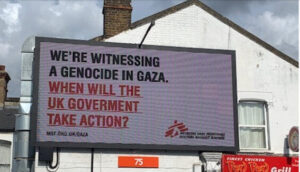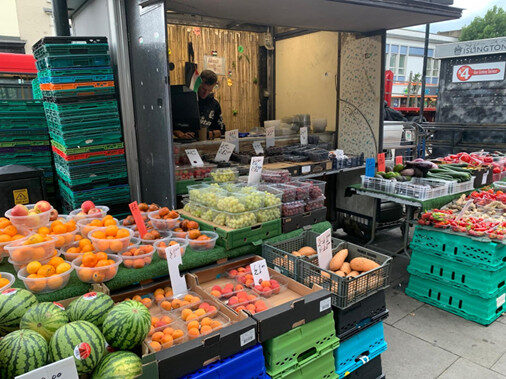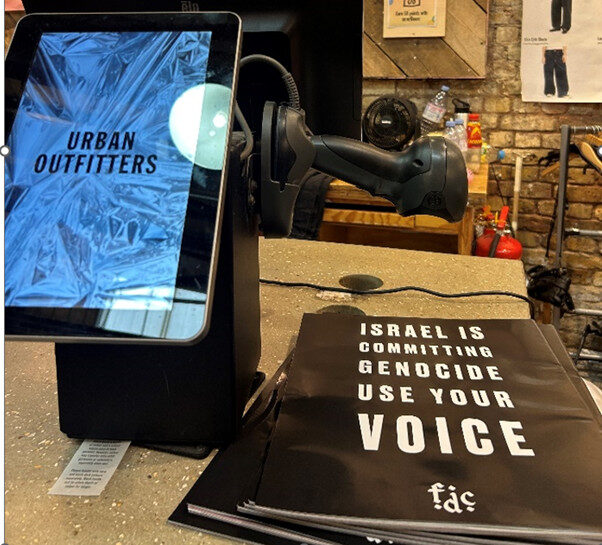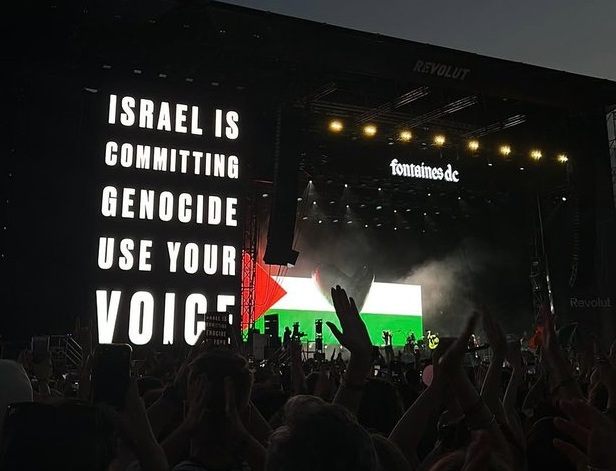A pro-Israel organisation whose chief executive claimed the Gaza war could increase the life expectancy of Palestinians by reducing obesity rates has come up with another grotesque idea. It is providing legal support for people claiming to be distressed — not by the terrible situation in Gaza but by public condemnations of it.
Since the beginning of July UK Lawyers for Israel (UKLFI) has taken up ten separate cases of distress — several of them involving people upset by the word “genocide”.

One case involved billboard posters for Médecins Sans Frontières that said: “We’re witnessing a genocide. When will the UK government take action?” According to UKLFI, Jewish members of the public found these words “upsetting and offending” … they were “likely to cause distress” and “likely to be considered insulting”. On that basis it claimed the posters were illegal under Section 5 and Section 18 of the Public Order Act — with the result that the billboard company suspended the advertising campaign.
Stifling free speech
UKLFI’s mission to shield people from distress raises important questions about the boundaries of free speech. In the view of the European Court of Human Rights, the demands of pluralism, tolerance and broadmindedness are so great — at least, in democratic societies — that freedom of expression should be protected even when it causes offence. In a landmark ruling in 1976, the court said freedom of expression applies not only to ideas “that are favourably received or regarded as inoffensive or as a matter of indifference, but also to those that offend, shock or disturb the State or any sector of the population” [italics added].
This is not to suggest that people have a right to cause offence gratuitously — in the words of the court, exercising free expression brings “duties and responsibilities” — but the horrendous situation in Gaza is surely not one where people should be forced to hold back from expressing their opinions for fear of upsetting someone who doesn’t like the message.
UKLFI has a long history of trying to stifle expressions of support for Palestinian rights and one of its methods is to scour legislation for anything that might create legal problems for campaigners. It presents this as an effort to ensure compliance with the law and denies trying to suppress free speech (though it does instantly block people who criticise it on X).
Stickers on a fruit stall
Earlier this month UKLFI reported that “some Jewish passers-by” had been upset to see a fruit stall outside Archway station in London plastered with Palestinian flag stickers saying “Boycott Israeli Apartheid” and “Free Palestine”.
The rented stall is owned by Islington council and, in a complaint letter to the council, UKLFI suggested the stickers — like MSF’s “genocide” posters— were advertisements violating the Public Order Act. UKLFI also hinted at offences under the Town and Country Planning Act (since the stickers did not have planning permission) and under Section 149 of the Equality Act which says public bodies must pay due regard to “the need to foster good relations” between different religious and ethnic communities.
In its reply, Islington council sidestepped these legal issues by saying the stickers were not advertisements but “litter” and it would have them removed by street cleaners along with any future stickers reported by the public.

The vague wording of Section 149 provides a useful tool for UKLFI to intimidate local authorities and other public bodies by accusing them of permitting socially “divisive” activities. One example, last year, was the cancellation of a booking by the Hitchin branch of the Palestine Solidarity Campaign to hold a kite-making workshop at a community centre owned by the local council. UKLFI also used Section 149 to secure the removal of decorative plates with designs by Gaza children which had been displayed on a wall in the Chelsea and Westminster Hospital for 11 years before anyone objected.
Shop customers ‘harassed’
When complaining about shops and other businesses UKLFI usually cites Section 29 of the Equality Act. The most recent example was Urban Outfitters in Camden where, according to UKLFI, many Jewish and Israeli customers were distressed and offended by the sight of a music-and-culture magazine called Crack. Copies of the magazine, which is given away free, had been placed near the tills, face-down and displaying a message on the back cover which said: “Israel is committing genocide, use your voice”.

Describing this as “offensive, misleading and designed to stir up hatred against Jews”, UKLFI accused Urban Outfitters of harassment under Section 29. For good measure it also accused the magazine of glamorising drugs, on the grounds that its name is “apparently a reference to crack cocaine”.
Urban Outfitters replied that someone had placed the magazines in the shop without authorisation and it had now destroyed them.
The Equality Act defines harassment as unwanted conduct that has the purpose or effect of “creating an intimidating, hostile, degrading, humiliating or offensive environment” for someone, or “violating” their dignity.
However, that only applies if the unwanted conduct is “related to a relevant protected characteristic”. Israelis and Jews are protected in the categories of “race” and “religion or belief” but in order to establish harassment UKLFI needs to show a connection between protected characteristics and the allegations of genocide.
It attempts to do this by resorting to atrocity denial: the allegations are untrue, it says, therefore they must be motivated by prejudice against Jews and Israelis rather than by abhorrence at events on the ground.
“It is very important to understand why the allegations of genocide are being advanced,” Natasha Hausdorff, UKLFI’s legal director, told a parliamentary committee. “It is not because there is any currency to the allegations — any real evidence to base them on.”
Having thus ruled out any possibility of actual genocide, UKLFI suggests talk of it is just a backdoor way of stirring up antisemitism. It is an example of “Holocaust Inversion”, UKLFI says — an attempt to portray Israelis as “the new Nazis” and Gazans as “the new Jews”.
Out of touch with public opinion
Although UKLFI has aspirations to create a “supportive climate of opinion” towards Israel in Britain, its views on Palestine are wildly out of line with those of successive British governments, not to mention most experts on international law. Among other things, it claims Israel’s occupation of the West Bank is lawful and that Jewish settlements there are legitimate. It objects to talk of apartheid as strongly as it objects to talk of genocide.
Such ideas also have little traction among the British public. While recent polls show slightly more than half think Israel was right to send troops into Gaza after the attack by Hamas, only 11% believe its actions since then have been proportionate.
Currently, 65% express some degree of sympathy for the Palestinians compared with 45% for Israel. Among those, 35% sympathise “a great deal” with the Palestinians but only 14% sympathise “a great deal” with Israel (a 19-point drop since the start of the Gaza war). Meanwhile, 30% have “no sympathy at all” for Israel and 15% have none for the Palestinians.
The British government’s recent move to recognise Palestine is a further sign of the enormous gap between UKLFI’s political stance and public opinion. UKLFI condemned the decision as perverse and “fundamentally wrong in principle” — yet polling shows supporters of recognition outnumber opponents by more than three to one.
Resisting intimidation
Far from boosting this limited support for Israel, UKLFI’s efforts tend to have the opposite effect, and one factor in that is the appearance of double standards. The attempts to constrain discourse about Israel’s occupation of Palestine have no parallel in relation to discourse about Russian occupation of Ukraine — which leads to a perception that where Israel is concerned the normal rules don’t apply.
The issues that UKLFI chooses to campaign about also generate perceptions of pettiness. Set against the wholesale destruction of Gaza, the uprooting of its population, the shooting of people queuing for food and the assassination of journalists, its preoccupation with “distressing” street posters and stickers with Palestinian flags suggests an odd sense of priorities.
UKLFI’s attempts to stifle criticism of Israel and support for the Palestinians have caused much annoyance among the people affected by them — especially in the field of arts and culture. Theatres, concert halls, cinemas and art galleries have all been recipients of its legal threats.
Some have resisted while others, worried about bad publicity or the trouble and expense of hiring lawyers to defend them, have caved in. Surrendering meekly to UKLFI’s demands can easily make matters worse, though. Some of those who did have faced an angry response from objectors in the form of petitions, boycotts, sit-ins and withdrawal from exhibitions.
For UKLFI, targeting cultural activity is a high-risk strategy because it raises fundamental questions about the purpose of art and is seen as a threat by those who guard their freedom of expression and believe art should be relevant and engaged with contemporary issues.
The arts and culture community is one section of society that resents outsiders telling it what to do. Its members are inclined to be vociferous and are also better placed than many people to make their voices heard.
Popular music is where those voices are currently most noticeable and Crack — the magazine that caused offence at Urban Outfitters — is one illustration. Artists featured on its pages often express solidarity with Gaza and its website has a list of records produced to raise money for relief efforts. The cover story of its July issue was a long read about Radio Alhara, a Palestinian online radio station that “has come to symbolise defiance and hope amid the unimaginable horrors of the Gazan genocide, giving voice to creative resistance in Palestine and across the world”.
The message on Crack’s back cover that stirred UKLFI’s ire by urging people to “use your voice” against genocide was a slogan adopted by the Irish band Fontaines DC and displayed on a large screen at recent performances.

Together with Massive Attack, Kneecap and Brian Eno, Fontaines DC recently joined an alliance to support artists who face reprisals for speaking out against Israel’s onslaught in Gaza. In a post on Instagram, Massive Attack said:
“We’re aware of the scale of aggressive, vexatious campaigns operated by UKLFI and of multiple individual incidences of intimidation within the music industry itself, designed solely to censor and silence artists from speaking their hearts and minds.
“Having withstood these campaigns of attempted censorship, we won’t stand by and allow other artists — particularly those at earlier stages of their careers or in other positions of professional vulnerability — to be threatened into silence or career cancellation.”
UKLFI — which had earlier likened one of Massive Attack’s performances to a Nazi rally — denied running aggressive and vexatious campaigns and responded by playing the victim card: Massive Attack was the one doing the bullying, it said, and attempts by Massive Attack and others to “demonise the groups which help victims of antisemitism” had led to UKLFI receiving hate mail.
* * *
More articles about UKLFI
From warfare to lawfare: Israel’s other battleground
2 August 2024
Pro-Israel lawyers target London arts venue in move to silence Palestinian voices
31 August 2024
Prominent Jewish peer resigns from pro-Israel activist group
10 September 2024
Cultural genocide: the battle to suppress Palestinian voices
17 September 2024
Pro-Israel campaigners get references to genocide removed from art exhibition
19 September 2024
Harassment claim by pro-Israel lawfare group ‘wholly without merit’
5 December 2024
Pro-Israel lawyers target climate activists over Gaza
10 January 2025
Shush! Don't mention genocide!
1 February 2025
UKLFI complains that talk of genocide is distressing for Israel’s supporters
21 August 2025

 RSS Feed
RSS Feed
